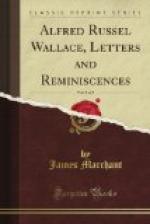ALFRED R. WALLACE.
* * * * *
TO PROF. POULTON
Broadstone, Wimborne. April 3, 1905.
My dear Poulton,—Many thanks for copy of your Address,[31] which I have read with great pleasure and will forward to Birch next mail. You have, I think, produced a splendid and unanswerable set of facts proving the non-heredity of acquired characters. I was particularly pleased with the portion on “instincts,” in which the argument is especially clear and strong. I am afraid, however, the whole subject is above and beyond the average “entomologist” or insect collector, but it will be of great value to all students of evolution. It is curious how few even of the more acute minds take the trouble to reason out carefully the teaching of certain facts—as in the case of Romanes and the “variable protection,” and as I showed also in the case of Mivart (and also Romanes and Gulick) declaring that isolation alone, without Natural Selection, could produce perfect and well-defined species (see Nature, Jan. 12, 1899).... —Yours faithfully,
A.R. WALLACE.
* * * * *
TO SIR FRANCIS DARWIN
Broadstone, Wimborne. October 29, 1905.
Dear Mr. Darwin,—I return you the two articles on “Mutation” with many thanks. As they are both supporters of de Vries, I suppose they put his case as strongly as possible. Professor Hubrecht’s paper is by far the clearest and the best written, and he says distinctly that de Vries claims that all new species have been produced by mutations, and none by “fluctuating variations.” Professor Hubrecht supports this and says that de Vries has proved it! And all this founded upon a few “sports” from one species of plant, itself of doubtful origin (variety or hybrid), and offering phenomena in no way different from scores of other cultivated plants. Never, I should think, has such a vast hypothetical structure been erected on so flimsy a basis!
The boldness of his statements is amazing, as when he declares (as if it were a fact of observation) that fluctuating variability, though he admits it as the origin of all domestic animals and plants, yet “never leads to the formation of species”! (Hubrecht, p. 216.) There is one point where he so grossly misinterprets your father that I think you or some other botanist should point it out. De Vries is said to quote from “Life and Letters,” II., p. 83, where Darwin refers to “chance variations”—explained three lines on as “the slight differences selected by which a race or species is at length formed.” Yet de Vries and Hubrecht claim that by “chance variations” Darwin meant “sports” or “mutations,” and therefore agrees with de Vries, while both omit to refer to the many passages in which, later, he gave less and less weight to what he termed “single large variations”—the same as de Vries’ “mutations"!—Yours very truly,




